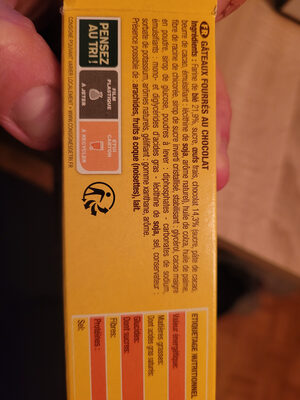Savane pocket barr' x 7 189g -brossard - 189 g
This product page is not complete. You can help to complete it by editing it and adding more data from the photos we have, or by taking more photos using the app for Android or iPhone/iPad. Thank you!
×
Some of the data for this product has been provided directly by the manufacturer JACQUET BROSSARD DISTRIBUTION.
Barcode: 3660140929257 (EAN / EAN-13)
Common name: Gâteaux fourrés au chocolat
Quantity: 189 g
Packaging: Box, Cardboard, fr:Film plastique à jeter, fr:Étui carton à recycler
Brands: Brossard
Categories: Snacks, Desserts, Sweet snacks, Biscuits and cakes, Cakes, Chocolate cakes
Labels, certifications, awards:
Green Dot, Made in France, No colorings, fr:Farine de blé français, Triman

Manufacturing or processing places: Pithiviers, Loiret, France, Centre
Link to the product page on the official site of the producer: https://www.brossard.fr/
Stores: Magasins U, Carrefour, Auchan, Cora, intermarché, Monoprix, carrefour.fr
Matching with your preferences
Other information
Preparation: N/C
Conservation conditions: A conserver dans un endroit sec et frais.
Customer service: service conseil consommateur, Biopole - Clermont Limagne 63360 - Saint Beauzire
Report a problem
Data sources
The manufacturer JACQUET BROSSARD DISTRIBUTION uses Equadis to automatically transmit data and photos for its products.
Product added on by openfoodfacts-contributors
Last edit of product page on by roboto-app.
Product page also edited by date-limite-app, driveoff, ecoscore-impact-estimator, inf, jacquetbrossard, julie-yuka, kiliweb, magasins-u, moon-rabbit, off.579cd4ba-23c0-429b-8607-0c208c4bf7d1, org-jacquet-brossard-distribution, packbot, tacite, teolemon, yuka.R2JraElaMDdpTk16dGNVWDFRaU8rSUo3NTRmelpreWRCdTBJSWc9PQ, yuka.SDZZTlNhNWFqOFVVbk5vL3pFalJxK3RReTVDVlYxRzFDT0FXSWc9PQ, yuka.SElBbEU3eGRpZGtxdXRnNTdpS0k1SXdvL3NLeEFHYTZkdlVLSVE9PQ, yuka.UXBBdU1aOHRuZUl6dmNBRG9oWE9xdDlUeFpxSlJUaUpPYkVQSWc9PQ, yuka.UjVBbEc0WXN1LzVWa2NOZzB5dlUwUFFvNEtHR1EzK3VMT0VmSWc9PQ, yuka.VDRBbkNha0l1TVV2aFBNQzhEYmF3TnQ1NGJDdldVYVlDdlFOSVE9PQ, yuka.VDVvU0c2MWNnZm83d2Ywd3BURFk1UGg2M1lXTEFWMlNKdUVnSVE9PQ, yuka.VDVvUkN2OENndVlzbFBadTdDdko0TlFxeWFLalFXMnBDdllUSVE9PQ, yuka.WjVzak1wVUJxZjBIcGZNOTRUejZ4dlpVbnBPa1V6S05Nc3RPSUE9PQ, yuka.YTdrYUhvTWxtZG9waWZBRTdEV09vUE55NkpxUVVqcXlFc296SVE9PQ, yuka.YlpFcktLUUlyZHNCbDhVRTRUakgyL0JLL01hcGUwaUlNcklJSWc9PQ, yuka.ZkxCWU1hRVRnZFVLdnMxdTVnamErY0FrNEtLYldtcnFEOFF2SVE9PQ, yuka.sY2b0xO6T85zoF3NwEKvlhVkDdTwgRDLaj3folS5wI2xcY64Oe9pwLDKDKs.












